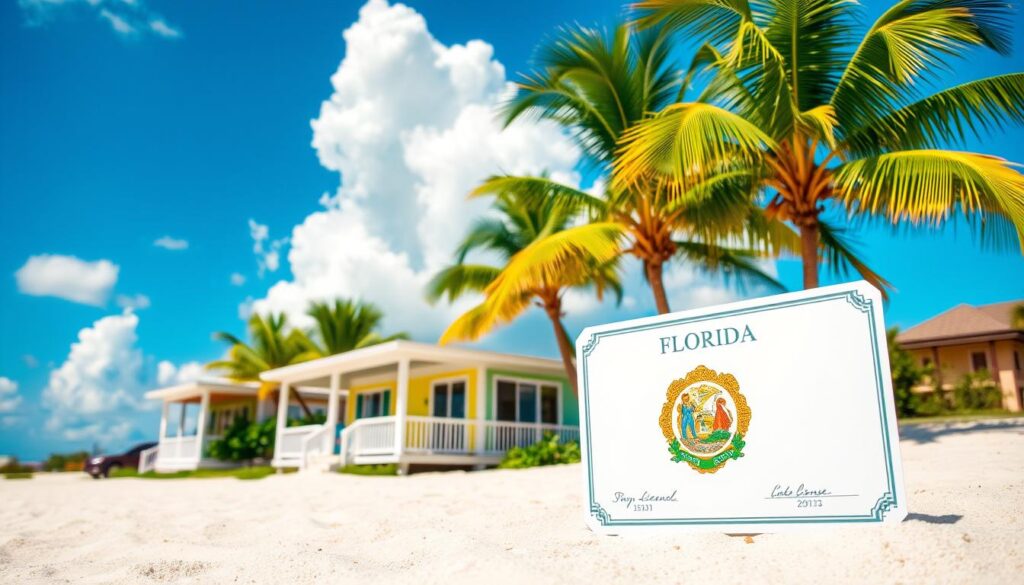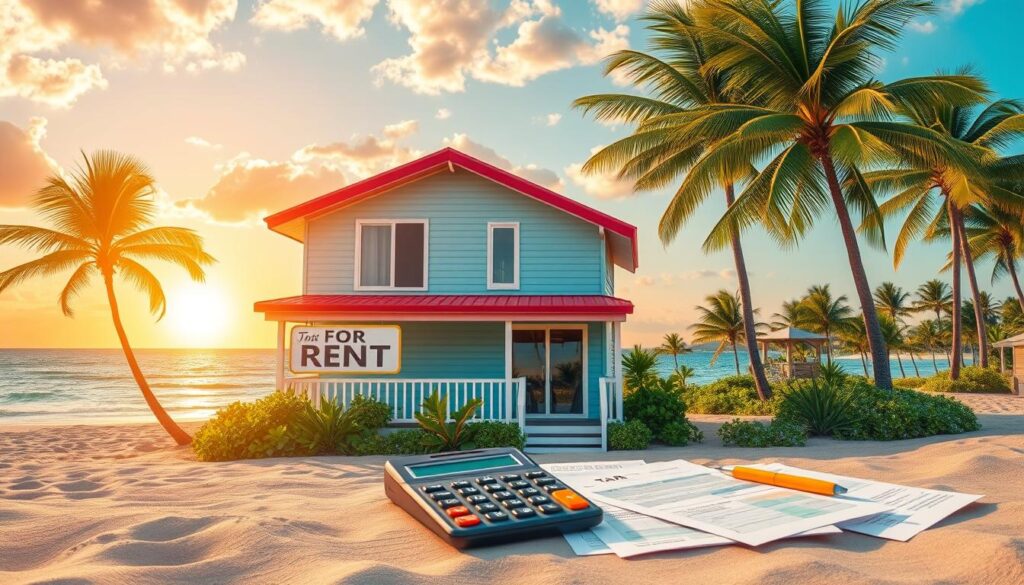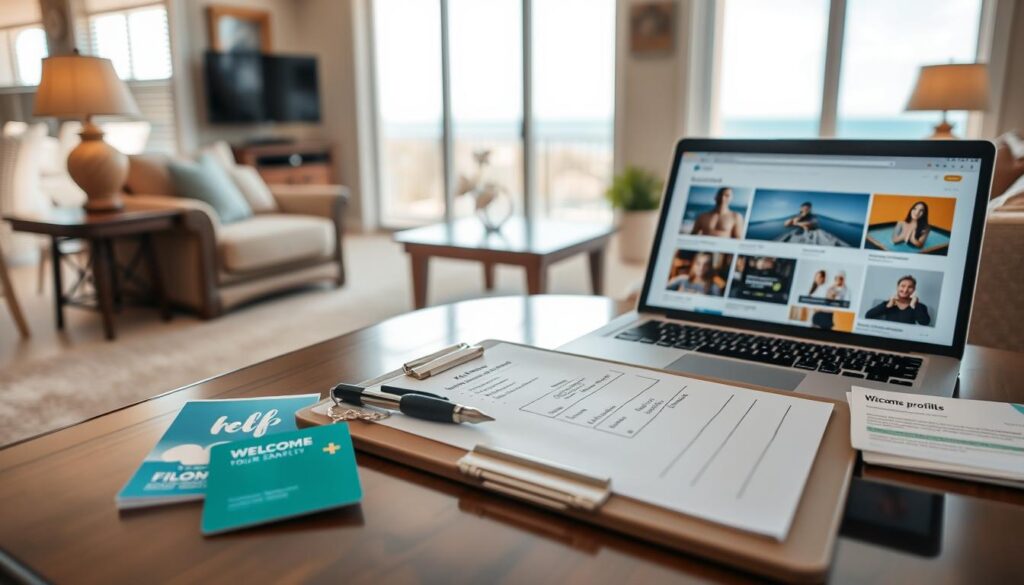The vacation rental industry is booming in Florida. It’s vital for property owners to know the latest laws and rules for short-term rentals. This guide will help you understand the legal side, so you can manage your vacation rental property well and follow the rules.
Key Takeaways
- Learn what short-term rentals in Florida are and the different types of vacation rentals.
- Know the state’s licensing needs, how to apply, and how to renew your license.
- Find out about the taxes you must pay, like sales tax and tourist development taxes.
- See how local rules, zoning laws, and HOA rules might affect your vacation rental.
- Make sure your property is safe and insured to protect your guests and your investment.
- Learn about the importance of good property management, upkeep, and guest screening.
- Understand the penalties and violations for not following Florida’s short-term rental laws.
Understanding Short Term Rentals in Florida
Exploring Florida vacation rentals means knowing what a short-term rental is. It also means understanding the different types of vacation homes. This part explains the basics to help you understand the legal side of these unique places.
Definition of Short Term Rentals
In Florida, a short-term rental is a place you stay for less than 30 days. You can find everything from small apartments to big beach houses. These options give you a more personal and flexible stay than hotels.
Types of Vacation Rental Properties
Florida’s vacation rental market has many types of properties:
- Single-family homes
- Condominiums
- Townhouses
- Apartments
- Villas and resort-style accommodations
Each type offers different features, locations, and prices. They meet the needs and budgets of all travelers looking for the best Florida vacation rentals.
Key Terms and Concepts
To get the most out of Florida’s short-term rentals, learn these important terms:
- Vacation Rental Platforms: Sites like Airbnb, VRBO, and HomeAway help owners find guests.
- Occupancy Limits: Rules on how many people can stay in a rental.
- Zoning and Permitting: Local rules for running short-term rentals.
- Taxes and Fees: Taxes and fees, like tourist taxes and registration costs, that owners must handle.
Knowing these basics helps you understand the Florida vacation rentals world. It also makes sure you follow the laws and rules.
Florida Short Term Rentals Laws and Regulations
The vacation rental industry is booming in Florida. It’s key for property owners and managers to know the latest Florida rental laws, vacation rental regulations, and short-term rental legislation. This section gives an overview of the laws that govern short-term rentals in Florida.
Florida has laws to control the vacation rental market at the state level. The main law is the Florida vacation rental act. It sets up a statewide system for licensing and registering short-term rentals. Owners must get a license and follow rules like having liability insurance and meeting fire and safety codes.
Local areas in Florida also have their own vacation rental regulations. Many places have rules on zoning, how many people can stay, and noise. Owners need to check the local laws where their rental is to make sure they follow them.
“The Florida vacation rental landscape is constantly evolving, with new laws and regulations being introduced at both the state and local levels. It’s crucial for property owners to stay up-to-date on the latest short-term rental legislation to avoid potential fines and penalties.”
The state of Florida has a website and resources for vacation rental owners. It explains the Florida rental laws and rules for short-term rentals. By keeping up with the laws and following them, owners can run their vacation rentals smoothly and successfully.
Licensing Requirements for Vacation Rental Properties
Owning a vacation rental in Florida means following certain rules. It’s key for property owners to know these rules well. This helps them run their business legally and avoid fines.
State License Application Process
To get a Florida vacation rental license, owners must apply to the Department of Business and Professional Regulation (DBPR). They need to give lots of details about the property, its owners, and how it will be used.
Required Documentation
- Proof of owning or managing the rental property
- Copies of any business licenses or tax IDs
- Proof of meeting local zoning and safety rules
- A filled-out application form
Renewal Procedures
Florida vacation rental licenses need to be renewed every year. This means updating info and paying a renewal fee. Owners must remember the renewal deadline to keep their rental property permit active.
“Getting and keeping the right Florida vacation rental license is crucial. It lets owners run their rentals legally and avoid fines.”
By following Florida’s rules for vacation rentals, owners can keep their business legal. This also helps protect their investment.
Tax Obligations for Florida Rental Property Owners
If you own a vacation rental in Florida, you need to know about tax rules. These include state sales tax and local tourist development taxes. It might seem hard, but following these rules is key.
The Florida rental taxes are a big deal for short-term rentals. The state sales tax is 6%. You must collect and send this tax to the Florida Department of Revenue regularly.
Florida also has a tourist development tax, or bed tax. It’s charged on short-term rentals. The rate varies but is usually 4-6% of the rental cost.
- Understand your obligations for vacation rental tax compliance in Florida.
- Familiarize yourself with the state sales tax and local tourist development taxes that apply to your rental property.
- Ensure you are collecting and remitting these taxes accurately and on time to avoid penalties.
| Tax | Rate | Responsible Party |
|---|---|---|
| Florida State Sales Tax | 6% | Vacation rental property owner |
| Tourist Development Tax (Bed Tax) | 4-6% | Vacation rental property owner |
Keeping up with Florida rental taxes and following tax rules is crucial. By knowing your duties and handling taxes right, you can dodge fines. Plus, you help the local economy.
Local Municipality Restrictions and Zoning Laws
Short-term rentals in Florida need to follow local rules and zoning laws. Each area has its own set of rules. It’s key to know the specific rules for where your rental is.
County-Specific Regulations
Florida’s counties have their own rules for short-term rentals. These can include needing a special permit or limiting how many guests you can have. Knowing the county’s rules is important to follow them.
HOA and Condo Association Rules
HOAs and condo associations also have rules for short-term rentals. These can limit how many days you can rent out, require insurance, or even ban rentals. Always check your HOA or condo association’s rules.
Noise and Occupancy Limitations
Florida’s local governments have rules to keep neighborhoods quiet and safe. These rules might limit how many guests you can have or when you can make noise. Breaking these rules can lead to fines.
| Florida Zoning Laws | Local Rental Restrictions | HOA Rental Rules |
|---|---|---|
| County-specific regulations on licensing, permits, and restrictions | Occupancy limits, noise ordinances, and permit requirements | Restrictions on number of rental days, liability insurance, and bans on vacation rentals |
Following local rules and zoning laws is crucial for short-term rental owners in Florida. It helps avoid fines and keeps your business running smoothly. Keeping up with new regulations is key for success in the Sunshine State.
Safety and Insurance Requirements
In Florida, making sure guests are safe is very important. Property owners must follow strict safety rules and have good insurance. This protects their property and guests.
One important vacation rental safety standard in Florida is having working smoke detectors, carbon monoxide detectors, and fire extinguishers. Stairways, balconies, and common areas must also be safe and well-lit. Owners need to follow local building codes and get the right permits and inspections.
For Florida rental property insurance, owners should get a policy that includes liability coverage. This helps if someone gets hurt or has an accident at the property. Good policies also cover property damage and guest medical costs.
It’s also key to check the liability coverage limits in your policy. Experts say you should have at least $1 million per accident. Adding an umbrella policy can give you even more protection.
By following these safety and insurance rules, Florida vacation rental owners can make sure guests have a great time. They also protect their investment and avoid big financial losses.
“Prioritizing safety and maintaining proper insurance coverage is essential for any vacation rental property owner in Florida. It’s not only a legal requirement, but it also demonstrates a commitment to the well-being of your guests.”
Property Management and Maintenance Standards
Keeping vacation rental properties clean and well-maintained is key for a great guest experience. It also helps keep your business’s reputation high. Good property management means following strict cleaning and maintenance rules.
Cleaning Protocols
Setting clear cleaning standards is crucial for vacation rentals. This includes a detailed checklist for each guest stay. Tasks include:
- Thoroughly cleaning and disinfecting all surfaces, including countertops, floors, and bathrooms
- Changing linens, towels, and other bedding
- Replenishing essential amenities like soap, shampoo, and toilet paper
- Inspecting the property for any damage or maintenance issues
Following these cleaning protocols ensures guests find a clean and welcoming place. This sets the stage for a great stay.
Regular Maintenance Schedule
Vacation rentals also need a solid maintenance plan. This includes regular tasks like:
- Inspecting and servicing HVAC systems
- Checking and replacing air filters
- Cleaning gutters and downspouts
- Maintaining the pool and outdoor areas
- Addressing any necessary repairs or replacements
Regular maintenance helps prevent problems and keeps your property ready for guests.
Emergency Procedures
Even with good maintenance, unexpected issues can arise. It’s important to have a plan for emergencies. This includes:
- Maintaining a list of reliable, vetted service providers for plumbing, electrical, HVAC, and other repairs
- Establishing a process for quickly communicating with guests and addressing their concerns
- Ensuring you have the necessary supplies and equipment on hand to respond to common emergencies
Being proactive and having a solid emergency plan helps keep guest satisfaction high.
Using a detailed approach to property management and maintenance is key for success. Focus on cleaning, regular maintenance, and being ready for emergencies. This ensures a top-notch experience for your guests and keeps your properties valuable in the long run.
Guest Screening and Rental Agreements
Managing a successful short-term rental business starts with vacation rental screening and Florida rental agreements. The guest vetting process protects your property and ensures a great experience for everyone.
To screen guests, you need a detailed review process. This includes checking IDs, verifying contact info, and running background checks. These steps help avoid bad renters and keep your property safe.
- Require a valid government-issued ID for verification
- Verify contact information (phone, email, address)
- Conduct a background check on prospective guests
Creating detailed Florida rental agreements is also key. These agreements should list the rental rules, like check-in times and damage deposits. Clear rules help avoid problems and make the rental smooth for everyone.
| Key Elements of a Vacation Rental Agreement | Importance |
|---|---|
| Check-in and check-out times | Establishes clear expectations and prevents confusion |
| Damage deposits and fees | Protects the property owner against potential damages or excess cleaning |
| Cancellation and refund policies | Provides a clear understanding of the financial obligations for both parties |
| Occupancy limitations | Ensures compliance with local regulations and preserves the quality of the rental experience |
With a strong vacation rental screening and detailed Florida rental agreements, you can reduce risks and protect your property. This approach is vital for your short-term rental business to thrive in the long run.
Penalties and Violations for Non-Compliance
Following Florida’s short-term rental laws is key for property owners and managers. Not following these rules can lead to serious penalties. Knowing the risks helps keep a vacation rental business running smoothly.
Common Violations
- Operating a rental property without the required state or local licenses
- Exceeding occupancy limits or failing to follow noise ordinances
- Neglecting to collect and remit applicable taxes
- Providing substandard safety and maintenance standards
- Violating zoning or homeowner association (HOA) restrictions
Fine Structure
The fines for Florida rental law violations can be quite high. Fines for short-term rental fines can go from $1,000 to $5,000 per violation. The amount depends on how serious and how often the violation happens. If you keep breaking the rules, you could lose your rental license.
Appeals Process
If you get a notice of violation, you can appeal. The compliance enforcement process includes a formal hearing. Here, you can show evidence and make your case. If the violation is confirmed, you’ll have to pay the fines and might face more penalties.
| Violation | Fine Range | Repeat Offense Penalty |
|---|---|---|
| Operating without a license | $1,000 – $5,000 | License suspension or revocation |
| Exceeding occupancy limits | $1,000 – $3,000 | Increased fines, probation |
| Failing to collect/remit taxes | $1,000 – $3,000 | Fines, probation, temporary rental ban |
| Substandard safety/maintenance | $1,000 – $3,000 | Increased fines, probation |
| Violating zoning/HOA rules | $1,000 – $3,000 | Increased fines, probation |
Knowing about Florida rental law violations, short-term rental fines, and compliance enforcement helps property owners stay compliant. This proactive approach is key for a successful short-term rental business in Florida.
Conclusion
Navigating Florida’s short-term rental laws is key for property owners and managers. Following state and local rules is not just legal. It also helps your rental business thrive.
Knowing about licenses, taxes, safety, and management tips is vital. This knowledge helps your Florida vacation rental succeed. Always stay updated on Florida vacation rental compliance, use short-term rental best practices, and follow rental property management tips closely.
As you keep working in Florida’s vacation rental scene, remember these important points. With hard work, commitment, and following the laws, you can offer great experiences to guests. And you’ll protect your investment for the future.








